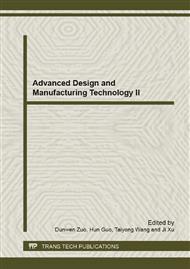p.3
p.10
p.22
p.26
p.31
p.34
p.39
p.45
Assembly Sequence Planning Including Tool Check Based on Improved Ant-Colony Algorithm
Abstract:
According to the characteristics and demands of assembly sequence planning (ASP) of complicated electromechanical products, the improved Ant-Colony algorithm is presented to solve the problem. In order to plan assembly sequence, Precedence Graph, which is created based on assembly model, is created to record precedence relations between components. Several mechanisms are designed to make the precedence relations correct and compendious. To examine the feasibility of the sequences for tool’s operation, a quick checking method is proposed based on Potential Interference Information, which is created by simulating the tool’s movement and checking the interference information in entire assembly. Then, the Ant Colony Algorithm is improved to generate optimal assembly sequences with the guidance of precedence relations. Two important influence factors have been taken into account in the method. (1) A Penalty-Evaporation mechanism is proposed for the algorithm to punish unfeasible solutions. (2) Via analyzing the effects of the parameters in the state transfer function, the better solution is obtained while change the fixed parameters to transforming with time. Finally, an example illustrates the effectiveness of the strategy.
Info:
Periodical:
Pages:
3-9
DOI:
Citation:
Online since:
March 2013
Price:
Сopyright:
© 2013 Trans Tech Publications Ltd. All Rights Reserved
Share:
Citation:


